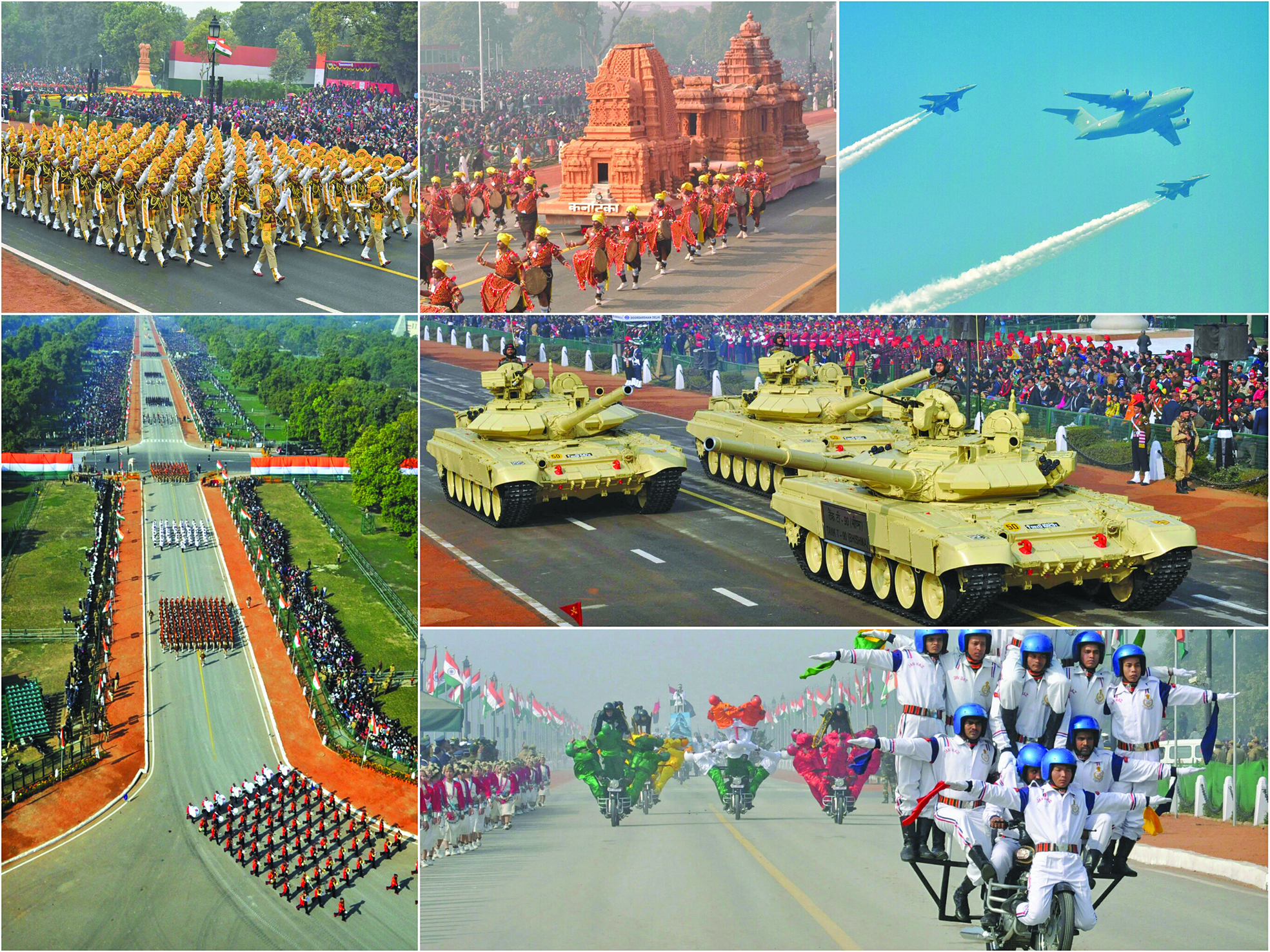 India is all set to celebrate her 75th Republic Day on January 26th, 2024, marking the date on which the Constitution of India came into effect (26 January, 1950), and India became a Republic in 1950. The celebrations in the capital include the annual parade at Rajpath (Kartavya Path) featuring march-pasts by the Indian Armed Forces personnel vibrant tableaux showcasing the diversity and culture of different states. In a spectacular flypast, various aircrafts of the Indian Armed Forces participate and perform stunning aerial manoeuvres.
India is all set to celebrate her 75th Republic Day on January 26th, 2024, marking the date on which the Constitution of India came into effect (26 January, 1950), and India became a Republic in 1950. The celebrations in the capital include the annual parade at Rajpath (Kartavya Path) featuring march-pasts by the Indian Armed Forces personnel vibrant tableaux showcasing the diversity and culture of different states. In a spectacular flypast, various aircrafts of the Indian Armed Forces participate and perform stunning aerial manoeuvres.
The Republic Day parade is attended by honourable dignitaries from other countries, Indian politicians, as well as the general public. For India’s 75th Republic Day Celebrations, Emmanuel Macron, President of France, will visit India as the Chief Guest, at the invitation of PM Narendra Modi.
The day will also witness the Indian President conferring Padma Awards to deserving Indian civilians, and brave soldiers will be awarded with the prestigious Paramvir Chakra, Ashok Chakra and Vir Chakra. The Republic Day celebrations last for three days, and end with the Beating Retreat ceremony, on 29th January.
Did you know, that though India attained Independence on August 14, 1947, she didn’t have a permanent constitution until 26th January, 1950! Prior to 1950, Indian laws were based on the Government of India Act – 1935, which was the UK’s Act of the Parliament. On gaining Independence, the new Congress-led Government of India invited Dr. B R Ambedkar to serve as the nation’s first Law Minister. Soon after, on 29th August, 1947, he was appointed Chairman of the Constitution Drafting Committee, and was delegated by the Assembly to write India’s new Constitution.
The Constitution is important because it ensures that those who make decisions on behalf of the public, fairly represent public opinion. It also sets out the ways in which those who exercise power can be held accountable to the people they serve. The Constitution is the foundation on which the edifice of democracy is built and functions. It defines the rights and responsibilities of a citizen over state and other persons. It also determines the duty of the state and the duty of the individual vis a vis the country.
The Indian Constitution has borrowed provisions from the constitutions of various other countries. The ideals of Liberty, Equality, Fraternity come from the French Constitution and these words appear in the Preamble to the Constitution of India. Of course, several other nations too have adopted the French slogan of ‘Liberty, Equality, and Fraternity’, as an ideal. The Constitution is a reminder to what ‘we the people of India had solemnly resolved to constitute India into’ – ‘a Sovereign Socialist Secular Democratic Republic’ and to secure to all its citizens:
- Justice – social, economic and political;
- Liberty – of thought, expression, belief, faith and worship;
- Equality – of status and of opportunity, and to promote among them all,
- Fraternity – assuring the dignity of the individual and the unity and integrity of the Nation;
There are Six Fundamental Rights recognized by the Indian Constitution:
- The Right to Equality;
- The Right to Freedom;
- The Right against Exploitation;
- The Right to Freedom of Religion;
- Cultural and Educational Rights; and
- The Right to Constitutional Remedies.
Honouring The Memory Of Netaji Subhash Chandra Bose
23rd January marks the birth anniversary of the great Netaji Subhash Chandra Bose. The Union Culture Ministry announced that this day be celebrated every year as ‘Parakram Diwas’ or ‘Day of Courage’, in honour of this National hero.
Netaji (leader), as he was fondly known as and is remembered even today, was initially influenced by the teachings of Mahatma Gandhi and had joined the Indian National Congress. But he also had the courage of his convictions to differ with Gandhi and the Congress to move on and walk his own path, on his own terms. He refused to follow herd-mentality, which is the test of a true leader.
In 1930, he was imprisoned for a year, during the Civil Disobedience Movement. Later, he was expelled from India to Europe but taking advantage of the situation, he worked to strengthen the ties between the two countries. He had the ability to turn adversity to his advantage, which is yet another quality of a good leader.
Netaji believed that reality is, after all, too big for our frail understanding to fully comprehend. Nevertheless, we had to build our life on the theory which contains the maximum truth. One individual may die for an idea, but that idea will, after his death, incarnate itself in a thousand lives.
Two quotes of Netaji, apt for reflection by both – our country and our community:
“The greatest crime is to compromise with injustice and wrong. Remember the eternal law: you must give if you want to get.”
and
“Freedom is not given, it is taken.”
Long live the letter and spirit of our magnificent Constitution and long live the courageous spirit of Netaji Subhash Chandra Bose!
Happy Republic Day to all!
- જેજે હોસ્પિટલના પારસી વોર્ડમાં નવરોઝની ઉજવણી - 5 April2025
- ઝોરોસ્ટ્રિયન વિમેન્સ એસોસિએશન ઓફ સુરત દ્વારા પાણી બચાવો પર્ફોર્મન્સ - 5 April2025
- આવાં યઝદના પરબની ઉજવણી - 5 April2025
